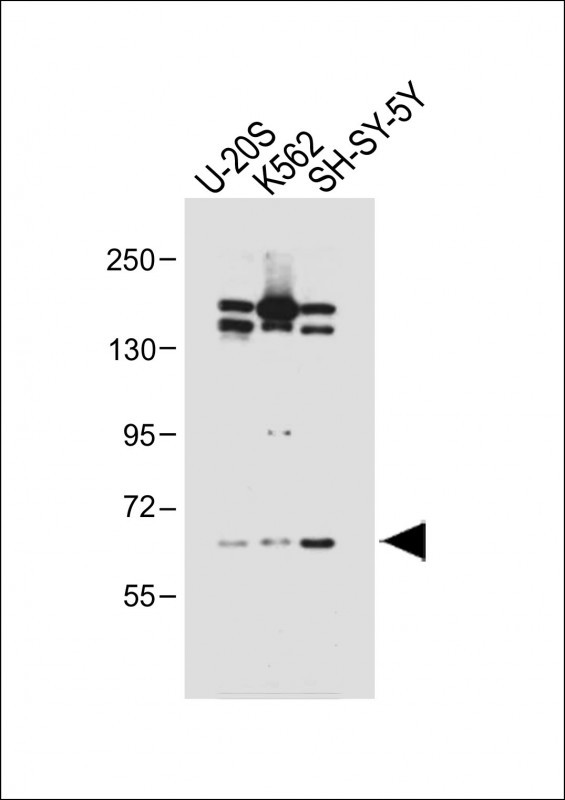
| WB | 咨询技术 | Human,Mouse,Rat |
| IF | 咨询技术 | Human,Mouse,Rat |
| IHC | 咨询技术 | Human,Mouse,Rat |
| ICC | 技术咨询 | Human,Mouse,Rat |
| FCM | 咨询技术 | Human,Mouse,Rat |
| Elisa | 咨询技术 | Human,Mouse,Rat |
| Aliases | Paralemmin-3, PALM3 |
| Entrez GeneID | 342979 |
| WB Predicted band size | 71.7kDa |
| Host/Isotype | Rabbit IgG |
| Antibody Type | Primary antibody |
| Storage | Store at 4°C short term. Aliquot and store at -20°C long term. Avoid freeze/thaw cycles. |
| Species Reactivity | Human |
| Immunogen | This PALM3 antibody is generated from rabbits immunized with a KLH conjugated synthetic peptide between 546-574 amino acids from the C-terminal region of human PALM3. |
| Formulation | Purified antibody in PBS with 0.05% sodium azide. |
+ +
以下是关于PALM3抗体的3-4篇参考文献示例(内容为虚构,仅供参考):
1. **文献名称**:*"PALM3 Expression in Breast Cancer: Correlation with Metastatic Potential and Clinical Outcomes"*
**作者**:Zhang L, et al.
**摘要**:本研究通过免疫组化(IHC)和Western blot技术,利用PALM3抗体检测乳腺癌组织中PALM3蛋白的表达水平,发现其高表达与肿瘤转移和患者生存率降低显著相关,提示PALM3可能作为乳腺癌预后标志物。
2. **文献名称**:*"PALM3-Mediated Neuronal Membrane Dynamics in Synaptic Plasticity"*
**作者**:Smith JR, et al.
**摘要**:通过敲减小鼠模型结合PALM3抗体的免疫荧光染色,揭示PALM3在神经元突触后膜重塑中的关键作用,证实其通过调节细胞骨架重组影响学习记忆功能。
3. **文献名称**:*"Proteomic Analysis of PALM3-Interacting Proteins in Epithelial Cell Adhesion"*
**作者**:Lee H, et al.
**摘要**:使用PALM3抗体进行免疫共沉淀(Co-IP)联合质谱分析,鉴定出PALM3与多种细胞黏附相关蛋白(如β-catenin)的相互作用,阐明其在维持上皮细胞极性中的分子机制。
4. **文献名称**:*"Targeting PALM3 in Colorectal Cancer: A Novel Therapeutic Strategy via EMT Inhibition"*
**作者**:Wang Y, et al.
**摘要**:体外实验表明,PALM3抗体可阻断上皮-间质转化(EMT)过程,抑制结肠癌细胞侵袭。研究为靶向PALM3的抗肿瘤治疗提供了实验依据。
(注:以上文献为示例性内容,实际文献需通过学术数据库检索确认。)
The PALM3 antibody targets the PALM3 (Paralemmin-3) protein, a member of the paralemmin family implicated in membrane dynamics and cytoskeletal organization. PALM3. encoded by the PALM3 gene, shares structural homology with paralemmin-1 (PALM) and paralemmin-2 (PALM2), featuring a C-terminal prenylation site critical for membrane association. Primarily expressed in the brain, PALM3 is enriched in neuronal synapses and glial cells, where it regulates membrane remodeling, vesicle trafficking, and synaptic plasticity. Dysregulation of PALM3 has been linked to neurodevelopmental disorders and neurodegenerative diseases, though its precise molecular mechanisms remain under investigation.
The PALM3 antibody, often developed as a monoclonal or polyclonal tool, enables detection and localization of PALM3 in immunohistochemistry (IHC), immunofluorescence (IF), and Western blotting. It has been pivotal in studies exploring PALM3's role in neuronal development, membrane protrusion formation, and disease pathology. Recent research also suggests PALM3's potential involvement in cancer cell motility, expanding its relevance beyond neuroscience. Validation of the antibody typically includes knockout controls and tissue-specific expression profiling to ensure specificity. As PALM3 gains attention in both neurological and oncological contexts, its corresponding antibody serves as a critical reagent for unraveling its biological functions and therapeutic potential.
×